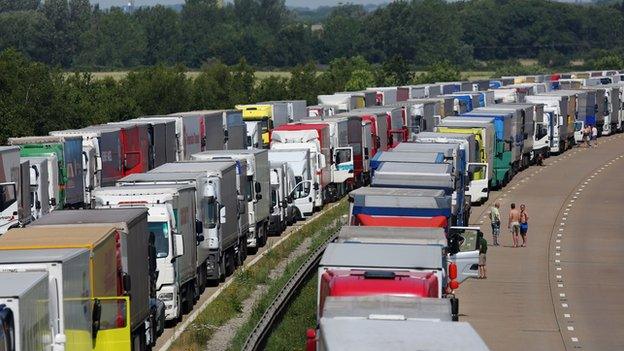Calais migrant crisis: France sends extra police to Channel Tunnel
- Published
The BBC's Duncan Kennedy speaks to migrants on the M20 who made it into the UK on Wednesday
France is to send extra police officers to Calais, as migrants say they will keep trying to reach the UK despite the deaths of nine people since June.
Migrants told the BBC going in groups of up to 400 gave them the best chance of getting into the Channel Tunnel.
Motorists using the tunnel's rail shuttle have seen delays in both the UK and France, while disruption to freight traffic is set to last all week.
The home secretary said new fencing was urgently being installed in Calais.
Speaking after a meeting of the government's emergency Cobra committee, Theresa May said: "Crucially, what we are looking at now is improving security at the railhead at Coquelles, so we can ensure people are not trying to come through the tunnel."
Operation Stack - where lorries are made to park on the M20 in Kent when Channel crossings are disrupted - is due to last into the weekend. Police said on Wednesday afternoon there were about 3,600 lorries in the queue.
The Department for Transport has announced it is bringing in a temporary relaxation of the rules that limit how long lorry drivers can drive for, external and how long they must rest to make it easier for businesses caught up in the disruption.
Holes in fences
French Interior Minister Bernard Cazeneuve said the extra 120 officers would be temporarily based in Calais and would help to secure the terminal area.
In response, Eurotunnel president Jacques Gounon agreed to "important investments to improve security on the Calais site" after the pair met in Paris on Wednesday.
It comes after Eurotunnel said 2,000 migrants had tried to get into the tunnel terminal on Monday, and 1,500 had tried on Tuesday.
The BBC's Gavin Lee said migrants in Calais had told him they would keep trying to get through a number of holes in security fences.

The man who died on Tuesday has been described by French police as Sudanese and aged between 25 and 30.
French police said he was probably crushed by a lorry which was exiting one of the shuttles that transport vehicles through the tunnel.
Elsewhere, in Paris an Egyptian man is seriously ill in hospital after he received an electric shock when he tried to stow away on a Eurostar train to London.

Travel latest
M20 closed London-bound from J9 to J8 and closed coast-bound from J8 to J11
Eurotunnel says its passenger services, external are running, with delays on the UK side; There are no delays from Calais
Freight services, external face delays on both the UK and French sides
P&O ferries, external and DFDS Seaways, external said their services between Dover and Calais were operating with minor delays

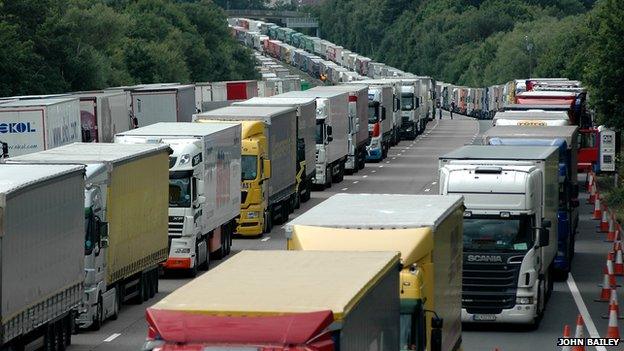
Operation Stack led to more than 3,000 lorries queuing on the M20
Footage shows migrants in Calais climbing over fences and walking along rail tracks
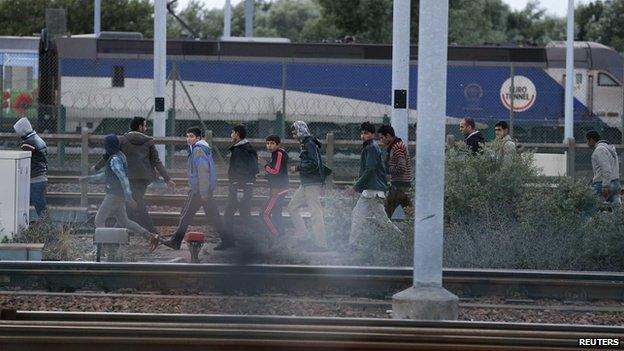
Migrants were photographed making their way along rail tracks near Calais on Wednesday
'Urgent work'
Eurotunnel says it has blocked 37,000 migrants trying to make their way to Britain since the beginning of the year.
A spokesman said it was an issue for the government to "sort out", adding. "We need them to stop the migrant flow from Calais but it appears to be too much for them to handle."
And Groupe Eurotunnel, which operates the Channel Tunnel, said the company had spent 13 million euros (£9.2m) on security in the first six months of 2015.
The UK has said it will contribute an additional £7m (10m euros) to secure the tunnel, on top of £12m (17m euros) it pledged in September.
Mrs May said some migrants had reached Britain through the Channel Tunnel this week and their appeals for asylum were being considered. But she but did not clarify how many had arrived.
She said Eurotunnel also had a role to play in implementing measures to protect the trains.
French Interior Minister Bernard Cazeneuve: "120 police officers will be temporarily posted at Calais"
Interim Labour leader Harriet Harman said the government needed to put pressure on the French authorities to process and document the migrants in Calais, where thousands are living in a makeshift camp.
"Either they are genuine asylum-seekers who should be given asylum or they should be deported," she said.
Labour MP Keith Vaz, who chairs the Home Affairs Select Committee, said he believed sending extra police would not solve the problem in Calais.
Mr Vaz said: "I went to Kent yesterday and I saw 148 of them who had made the journey and who were delighted because they had been successful in coming here, having evaded all this security, they actually managed to come here."
It is understood the 148 were detained by police on freight trains at Folkestone following the incursion by about 1,500 migrants at the Channel Tunnel entrance in Calais on Monday night.
Situation 'escalating'
Richard Burnett, Road Hauliers Association: Drivers say migrants use "bars and knives to bang on the sides of vehicles"
Transport Minister Andrew Jones said European Union limits on driving and rest time for lorry drivers would be relaxed after the government had listened to "the concerns of hard working lorry drivers who are suffering".
Maximum driving time will be extended from nine hours to 11 hours, while the daily rest requirement will be reduced from 11 to nine hours.
But Richard Burnett, chief executive of the Road Haulage Association, which represents lorry drivers, warned the crisis was "escalating".
He said: "We've got hundreds, thousands of examples of drivers that have been talking to us, telling us of their experiences where they've had 10-20 migrants surrounding their trucks, threatening them, taunting them, using bars and knives to bang on the sides of vehicles to threaten them and make them feel vulnerable."
The Freight Transport Association estimates that Operation Stack is costing the haulage industry about £700,000 a day.
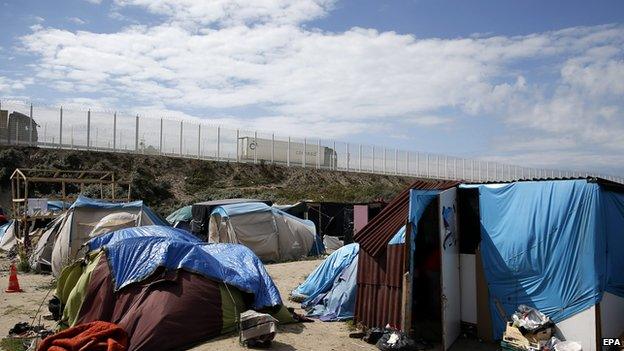
Hundreds of migrants are camped out near the motorway in Calais
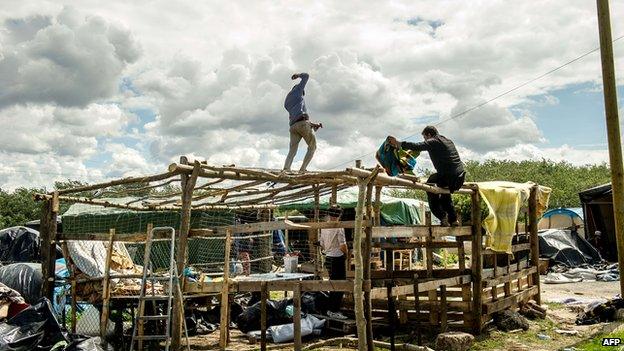
Makeshift shelters are being constructed
Speaking from Singapore, UK Prime Minister David Cameron said the government would do "everything we can" to work with the French to resolve the problem.
He added: "There's no point trying to point fingers of blame - it's about working with the French, putting in place these additional security measures, adding in the investment where that's needed. Britain will always come forward with that."
The UN High Commissioner for Refugees' representative in France, Philippe Leclerc, said most of the migrants in Calais were fleeing violence in countries like Syria, Eritrea, Somalia and Afghanistan.
He told BBC Radio 4's World at One programme they were among an estimated 200,000 who have crossed the Mediterranean to Italy and Greece in recent months.
Mr Leclerc also said the French authorities should do more to encourage migrants to claim asylum there.
- Published29 July 2015
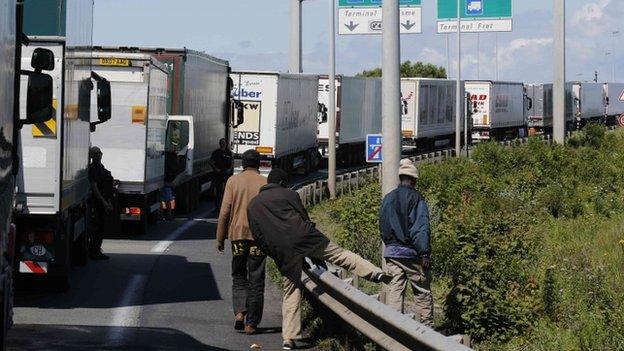
- Published29 July 2015
